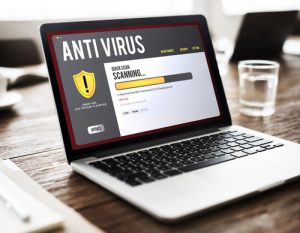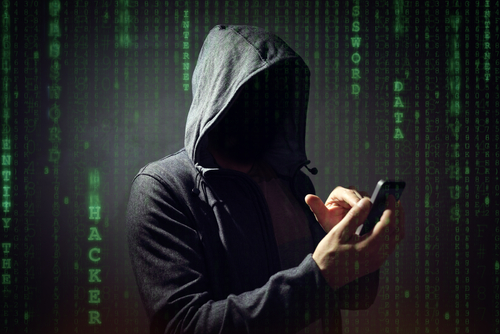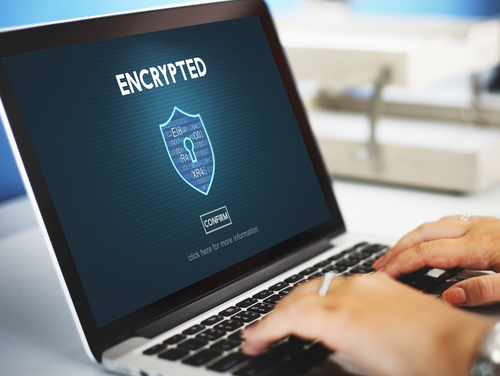The Covid pandemic ushered in a new era for working from home. Now, many people conduct their business from their home devices and private internet rather than on company devices and networks.
With this switch, it is more important than ever to protect your computer and data from hackers while working from home. These 14 security tips for work-from-home employees will help you keep your data and devices safe no matter where you are.

Security Risks For Work-From-Home Employees
As with working on the internet from any location, several ways working from home can be a security risk. It’s important to understand the risks and to protect yourself from those risks to keep your data, your company’s data, and your device safe from hackers.
Cybercriminals are becoming increasingly more clever and organized in the way they attack users and gain information. According to Databasix, remote work has increased the average cost of a data breach.
Email phishing scams are one of the most common causes of data breaches while working from home. Malware installation and identity theft were the most prevalent digital security threats for Italian companies as of February 2022.
Work-from-home employees have weaker security for the following reasons:
- Lack of firewall
- No cybersecurity teams monitoring home networks
- Brute force attacks on weakened or new company infrastructure
- Unsecured Wi-Fi networks either at home or in public places
- More Attack Surfaces due to more company software
- Unsecured personal devices used for business
- Working in public places
- Weak passwords
- Unencrypted file sharing
- Cloud access misconfigurations
- Webcam hacking
Many of these threats can be overcome by practicing good online security. Others are issues that companies are working to overcome as hybrid and remote working becomes more of the norm.
Top Security Tips for Work-From-Home Employees
We have compiled a list of ways you can improve your security while working from home. By following these tips and educating yourself on your company’s security policies, you will be able to keep your data more secure.
#1 Create strong passwords and use password managers
One of the simplest ways to protect your data from hackers is to have a strong password. Passwords are hard to remember sometimes, especially if you have several accounts you use regularly. It can be tempting to create an easy-to-remember password or by using the same password for all of your accounts.
However, this practice can leave your accounts vulnerable to attacks. It is important to make passwords that are at least 12 characters long with a combination of uppercase and lowercase letters, numbers, and symbols.
The strongest passwords do not use a word, name, character, product, or organization. It may seem daunting to remember a randomized password for every account you need to access multiple times a day, so it would be beneficial to use a password manager to keep track of your passwords.
Some will even remind you when it is time to change your password. Password managers can also generate new, strong passwords, and can even let you know if one of your passwords is compromised.
#2 Enable Multi-Factor Authentication
Muli-factor authentication (MFA) or two-factor authentication (2FA) is an additional way to keep your accounts secure. Many apps, online programs, and accounts have settings where you can enable MFA.
Once you enable it, this will make it harder for someone to get into your account, even if your password gets hacked. MFA works by prompting you to input a one-time passcode on a separate device that you should have nearby.
If you get a message asking for this passcode and you didn’t try to access your account, you know that someone was trying to gain unauthorized access. MFA may be a little inconvenient, but it gives you a chance to change the password before a cybercriminal gains access to your account and data.
#3 Use a VPN
Another way to add a layer of security while you are working from home is to connect to a virtual private network (VPN). A VPN is a way of obscuring your IP address and encrypting your internet traffic while connected to the WiFi.
When you use a VPN, as you connect to your home internet, the VPN server protects your activity with an encrypted tunnel that makes it difficult for hackers to break through. Many companies offer VPNs for an affordable price.
The company you work for may provide you with a VPN service, if you ask, as well. Try to avoid using free VPNs. Some of them are scams and free VPNs can be very risky to use.
#4 Add Firewalls
#5 Regularly Install Updates
When you are working from home, you need to make sure you keep all your firmware, software, and operating system updates current. Out-of-date programs can be weak to attacks. If you are worried you’ll forget to update your programs, you can enable automatic updates in the settings of your device, apps, and software to make the process easier.
Regularly updated devices are much more secure than those that are not.
#6 Monitor Your Emails
Emails are a weak spot for many companies and individuals. Scammers have come up with a variety of ways to trick users into divulging information through emails. They also attach malware programs to attachments, pictures, and links.
When you use your email, be sure to verify who the email is from. Many scammers use similar domain names to trick users who are reading quickly into clicking the email. Once you click an email, tracking bots can follow your online activity.
Also, never click on links inside emails that are unfamiliar. Even if an email is from someone you know, if the message doesn’t seem right, it probably isn’t. Phishing emails often have grammatical errors, are short, and encourage a sense of urgency.
Be sure to check and double-check before downloading any attachments or pictures. These can have malware on them that will download in the background of your computer. These can install viruses, worms, trojans, adware, or spyware onto your device, compromising its security.
Don’t sign up for newsletters or rewards programs using your business email. You may need a separate burner account for such emails. There are many ways you can protect yourself from spam emails.
#7 Keep Separate Work and Personal Devices
Although it may be tempting to use your preferred personal device for business, this is not a good idea. Your personal device may not be secured as well as your business one. Your company likely has installed firewalls and anti-virus software to protect you.
They may also monitor activity on your company device. So, it is important to use your work device for all your business transactions to keep them more secure.
#8 Encrypt Emails
Never share personal information on regular email. If you need to share account numbers or personally identifiable information (PII) on email, encrypt your email first. This will add a layer of protection to the email.
It may be beneficial to invest in an email hosting service that encrypts all your emails. Lone encrypted emails can stick out to scammers, but if all your email traffic is encrypted, someone monitoring your activity will be less willing to attempt to decrypt all of your traffic.
Even simple communications reveal a lot about you that a hacker can use to gain access to other accounts, so encryption gives you more anonymity while communicating with clients and coworkers.
#9 Enable Automatic Locking
Even though you are at home, it is still important to protect your physical device. Automatic locking will keep someone from accessing your computer when you step away. You can enable this feature by going into the settings feature on your device.
Remember to make your pin something difficult for criminals to guess. Birthdays and anniversaries are not great choices for PINs. You will also want to avoid sequential numbers or a repetition of single numbers, as these are also easy to hack.

#10 Add Antivirus
Some companies may install antivirus software on their company devices before you ever use it at home.
But, if your device doesn’t have antivirus software it is worth the investment. Antivirus software will alert you when you are about to download viruses and will help to protect your computer from threats.
#11 Keep Your Devices Safe
When you are taking your devices with you while traveling or even if you are leaving your device at home, be sure to take precautions. People can easily take your devices and hack into them, stealing your information.
You may want to have a secure place in your home where you can lock away any work laptops or mobile devices when you are not using them, especially if you are going to be away from home for a time.
If you are traveling, either keep your devices on your person or invest in a hotel lockbox to keep them safe when you are away from your room to protect your company’s data from being hacked.
#12 Don’t Use Public WiFi
Many free-to-access public WiFi are unsecured. So, it is important to use caution when sharing personal information while on public WiFi. Also, scammers can create fake hotspots or WiFi that you connect to.
Then, they can steal your information through the connection. Using a VPN while accessing the internet in public can help mitigate many of these issues. However, be aware of people physically spying on your work while in public.
They can take photos of confidential documents by looking over your shoulder. If you need to work in public, situate yourself in a corner away from view.
#13 Be Careful When Screen Sharing
Many companies collaborate using Zoom or Google Meets. If you are using the screen-sharing feature, make sure to check what is on your screen before casting. You could have PII visible on your screen that others can use to break into your accounts.
Other tabs, documents that may briefly flash across the screen, and even your screensaver may have information that a skilled hacker could use to gain access to your accounts. Check and double-check what is on your screen before screen-sharing with coworkers, even if you feel you can trust them.
You never know who else may be in the room with them.
#14 Understand Your Work Security Policies
The most important thing you need to do as a work-from-home employee is to familiarize yourself with the security policies of your company. They will likely have solutions to common problems and suggestions for how they would like you to keep their data safe while working from home.
They will likely provide you with security training to help educate you on risks and ways to tackle those risks that align with your company’s privacy policies. Take that training seriously and don’t be afraid to ask questions if you don’t understand something.
How Sekur Gives Your More Work-From-Home Security
Sekur has encrypted email, VPN, and instant messaging to help you work from home securely. Our 100% private platform is free from Big Tech hosting and does not data mine. With Sekur, you can communicate with your coworkers and clients privately and securely whether they are Sekur users or not.
All communications take place on our Swiss-hosted server and are encrypted with a proprietary 2048-bit tunnel. You can send encrypted emails, monitor email activity, and send unlimited-size attachments with SekurMail.
Our VPN keeps your IP address anonymous online and protects your data with the latest encryption technology. Our high-speed servers will keep you available to communicate with coworkers and clients 24 hours a day, 7 days a week with our state-of-the-art Tier-3 Swiss data centers.
Sekur can help you regain your privacy and give you the ability to work more efficiently and safely from home.
Conclusion
Working remotely is becoming more commonplace each year. As businesses shift to more hybrid work environments, security priorities shift as well. As a work-from-home employee, it is important for you to understand the risks of working from home and to educate yourself on ways to protect your company’s data.
By following these 14 security tips, you can better protect yourself and your data while working from home.

